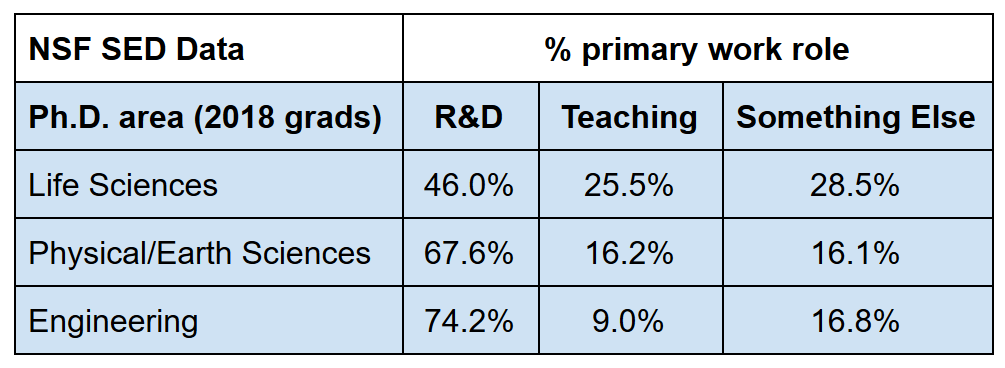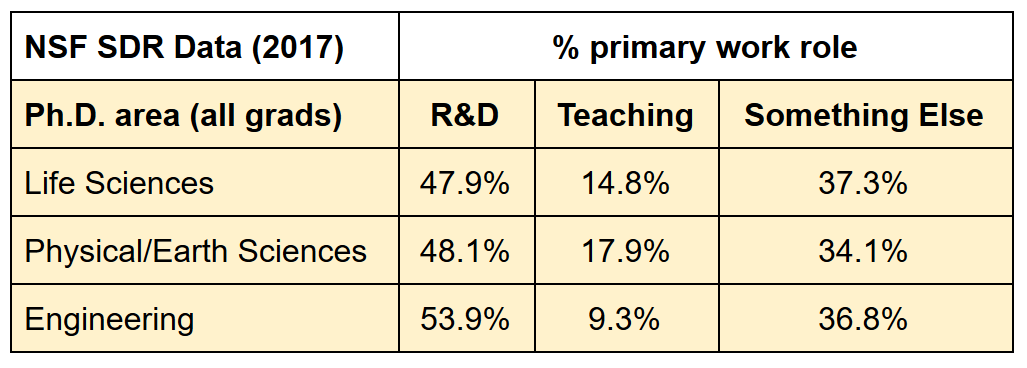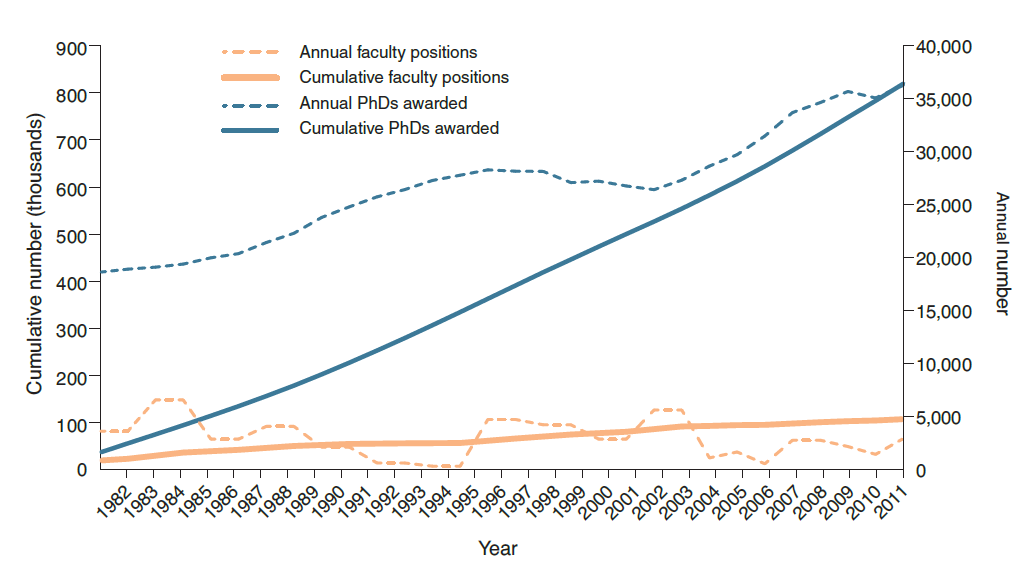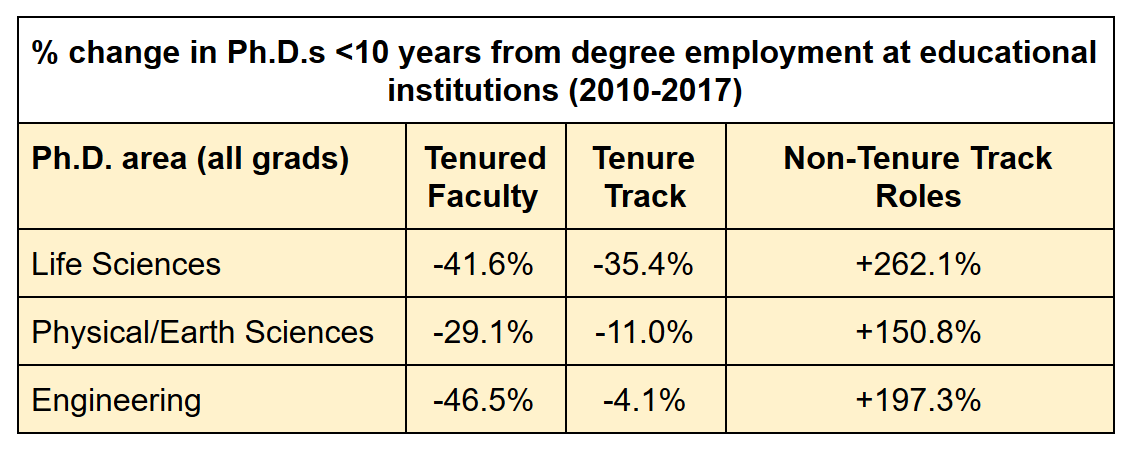The other major career bucket Ph.D.s fall into after their training is industry. What do we mean by “industry”, though? Many assume an industry Ph.D. works in pharmaceutical development or some other research and development (R&D) role, and some, indeed, do. However, there are so many additional roles Ph.D.s can fill in industry as well as in government, nonprofits, and academia that don’t fall into the neat buckets of academic or industry scientist.
A wealth of career data for Ph.D. recipients is collected by the National Science Foundation (NSF) in its Survey of Earned Doctorates (SED) and Survey of Doctorate Recipients (SDR). The SED focuses on recent Ph.D. graduates each year (Table 1) while the SDR captures employment information of individuals with Ph.D.s in science, engineering, or health fields, regardless of when they received their degree (Table 2).
A great challenge in graduate education and career/professional development is ensuring Ph.D.-trained researchers understand that the “traditional path” of securing a faculty position is becoming more difficult to follow. This trend was summed up well by Schillebeeckx et al 2013 (reproduced below), who show that the cumulative number of Ph.D.s awarded in Science & Engineering fields has grown rapidly compared to available faculty positions over the past few decades.
Where are these Ph.D.-trained scientists going? While some are moving into career fields outside of academia -- in fact the 2017 SED data showed private sector employment of science/engineering Ph.D.s (42%) was nearly on par with educational institution employment (43%) -- many are working in non-tenure track positions that could include lecturers, adjunct faculty, research faculty, or postdoctoral positions. Table 3, above, shows the 2-3x growth in these non-tenure track positions in a period of just 7 years.
Further examination of the 2017 data showed an astounding 17.1% (~1 in 5) of those with life science Ph.D.s employed at 4-year academic institutions were postdocs.
"A postdoctoral scholar (postdoc) is an individual holding a doctoral degree who is engaged in a temporary period of mentored research and/or scholarly training for the purpose of acquiring the professional skills needed to pursue a career path of his or her choosing."
-National Postdoctoral Association
| My own story navigating the academic career path I was one of those individuals on this default postdoc path. I had a great graduate school experience at UNC Chapel Hill and felt encouraged to stay in academia and pursue a postdoc with the goal of learning a new scientific technique (PET imaging of the dopamine system). My ultimate goal was to land a tenure-track faculty job. |
While the public sees a faculty job as pretty cushy -- and maybe after securing tenure it gets a bit more cushy (or at least secure in terms of your salary) -- the path to obtaining that tenured position is an arduous and tenuous one. There are so many places where one can fall off this pathway of postdoc -> assistant professor (on tenure-track) -> tenured faculty.
Collaborative work from the Future_PI Slack group which I have been involved with shows that every year, very qualified individuals who apply for assistant professorships don’t succeed.
The average person (and most family members of graduate students) really has no idea the challenges Ph.D.s face in launching their careers. I know I was certainly not the first person whose parents inquired when I would be “done” with training and get a “real job”. They meant well but, like many people, assumed once someone has a Ph.D., aren’t they “done” and on the quick path to fortune?
I spent 4.5 years as a postdoc at Vanderbilt University and it was a really wonderful time. I felt I grew as a person, contributed important work to my field of neuroscience, and gained leadership experience in the Vanderbilt Postdoctoral Association. And while I went deep down the path toward obtaining a faculty position (even getting an onsite interview back in Spring 2018), in the back of my mind I had doubts about being a faculty member; that path just didn’t feel right. Having access to career/professional development programming at Vanderbilt helped me learn about other career paths for Ph.D.s.
I now work in career and professional development helping current graduate students and postdocs at North Carolina State University. You can read more about my personal career exploration journey and transition to postdoc affairs in my series of NIH BEST blog posts.
Part of the search for a post-Ph.D. or post-postdoc career is a search for yourself. This sounds kind of intimidating - and it is. But trust me when I tell you people like me do make it through a challenging career search, and along the way they often discover what is most important to their wellbeing and happiness. Seems like a pretty nice outcome after navigating the hard, twisty road to a career.







 RSS Feed
RSS Feed